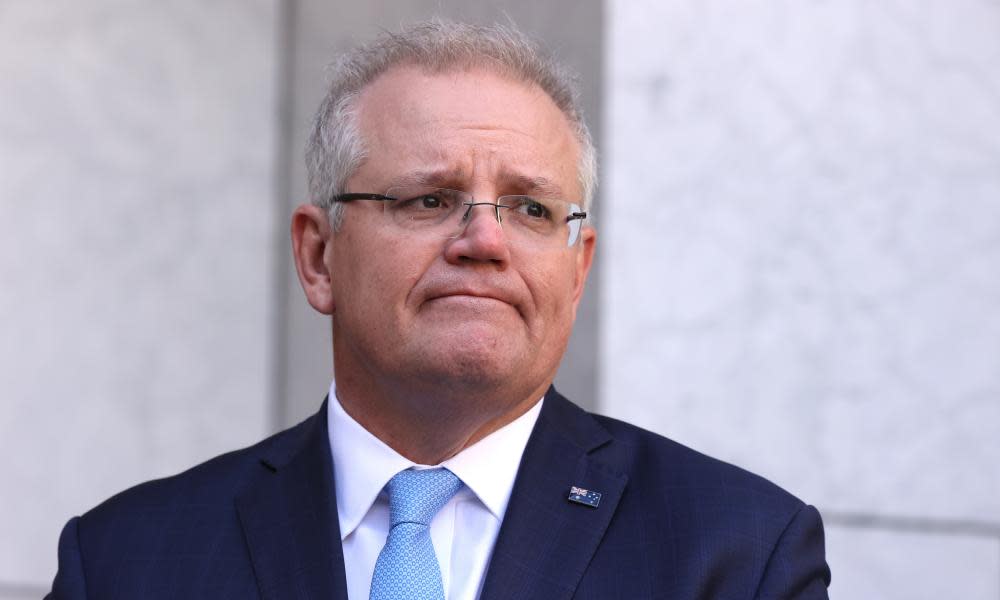Morrison backflips on move to strike down WA border ban with promise to 'assist' state

Scott Morrison has promised to “assist” the Western Australian premier’s push to have a fresh case consider the state’s border ban, in an attempt to unwind commonwealth intervention to strike down the ban.
Morrison’s offer on Thursday completes a total backdown on the legal challenge initiated by the mining magnate Clive Palmer, as the federal government has withdrawn from the case and seeks to rescind earlier material arguing the border ban is unconstitutional and unnecessary to fight the spread of coronavirus.
Morrison told 6PR Radio the commonwealth had joined the case following “constitutional convention” to appear and address “all the legal stuff” but had now made an exception because he did not want to cause “anxiety” to West Australians.
He argued the outlook was “completely different” when it joined the case and “a lot had changed” with the second wave outbreak of coronavirus in Victoria.
The case returns to the federal court on Friday for a case management hearing at which the commonwealth will explain its withdrawal and WA will use a letter from Morrison to help it argue for the case to be vacated.
The federal government intervened in the case on 12 June, which the attorney general, Christian Porter, explained it had done “to make constitutional arguments in support of the reopening of the borders”.
After the case was remitted to the federal court for fact-finding, the commonwealth solicitor general, Stephen Donaghue, made submissions supported by expert evidence arguing against WA’s border ban.
Related: Clive Palmer-backed court challenge to Queensland Covid-19 border closure dropped
In one submission dated 8 July, the commonwealth asked the court to find that if WA imposed a 14-day quarantine on arrivals from Victoria, it might take five months to 3.34 years for coronavirus to spread to WA from that state.
It also argued there was “low if not negligible” risk of travel from Queensland, South Australia, Tasmania, the Northern Territory and the ACT.
The WA premier, Mark McGowan, began to publicly call for the commonwealth to withdraw from the case – prompting assertions from Porter that it had not intervened to support Palmer but to clarify the interpretation of the constitution.
On Sunday, the Morrison government announced it would withdraw from the case.
McGowan wrote to Morrison requesting the federal government support WA’s push for the current case to be vacated and a new trial ordered.
“Currently all of the federal government’s evidence presented to the federal court last week has not been struck out,” McGowan said.
“This means the prime minister’s public statement to ‘withdraw’ from supporting Clive Palmer’s action against WA is meaningless.”
On Thursday, Morrison told reporters in Canberra he will reply to McGowan “in a way that I believe will assist the WA government in what they’re seeking to achieve”.
Morrison said the WA government had made “no other requests” when it asked the commonwealth to withdraw, which it did “forcibly and comprehensively” on Monday.
Morrison said the WA premier has “no quarrel” with him on the border ban case and “his quarrel is elsewhere” – an apparent reference to Palmer.
Morrison later told 6PR the WA government could improve its chances in the case if the border ban were not “indiscriminate”, if it consulted neighbouring states and mitigated “unintended consequences”.
Palmer has thanked the Morrison government for its intervention in the case and the University of Sydney professor Anne Twomey has noted withdrawal will not stop the court considering the commonwealth’s material.
“The commonwealth has already contributed on the critical issue over whether these laws are reasonably necessary to protect public health … it’s already played its major role,” Twomey reportedly told the Australian.
“Withdrawing now doesn’t stop the federal court taking account of the commonwealth’s evidence last week in their judgment and ultimately the high court will consider that too.”

 Yahoo News
Yahoo News 
